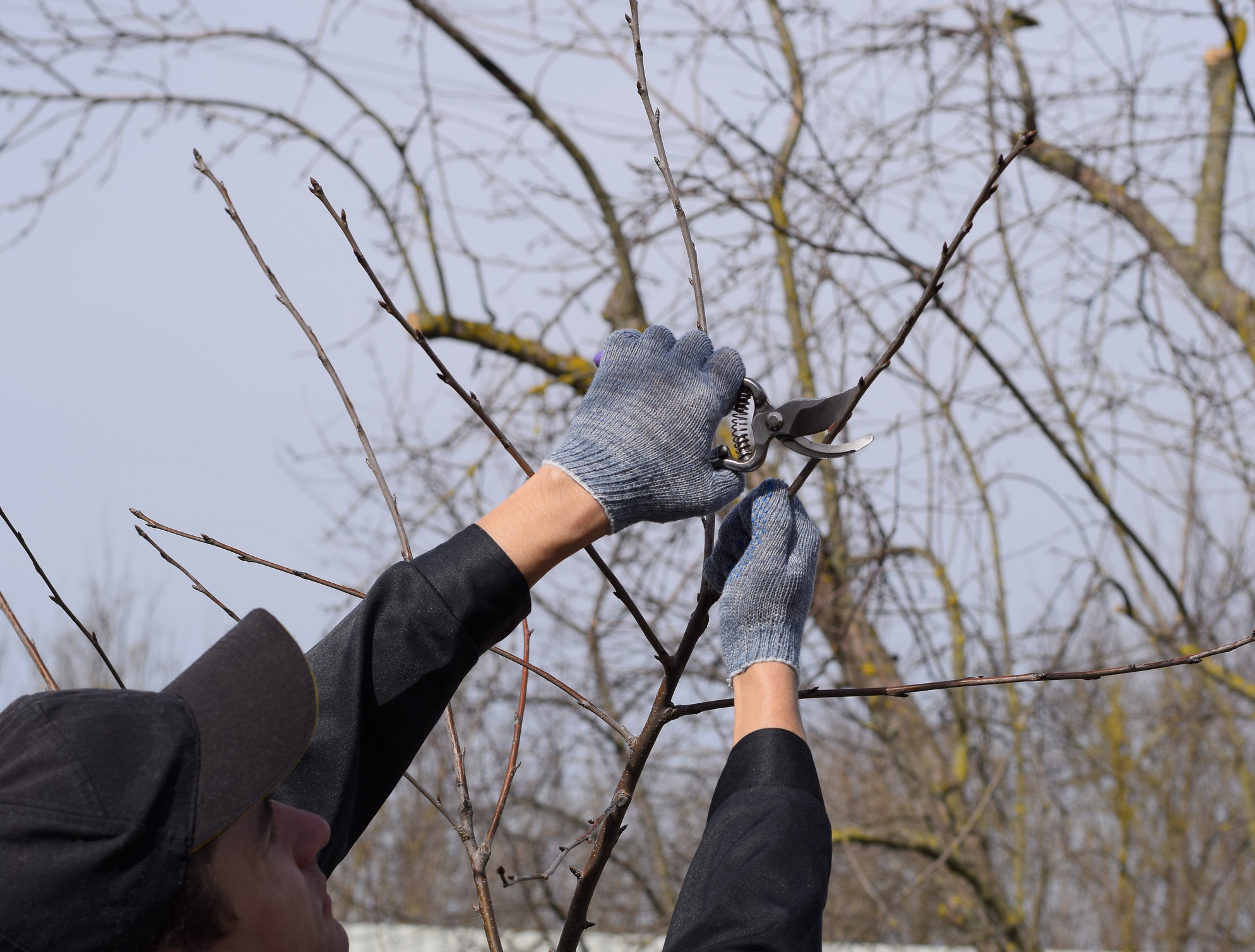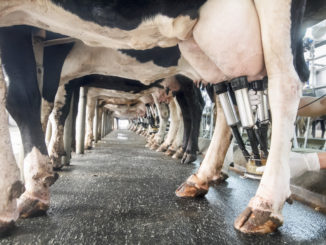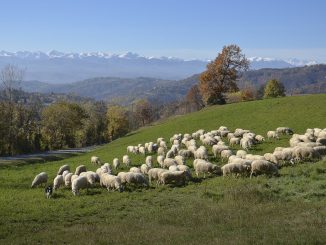
Many British farmers are in a bad place. While there is some overlap with the struggles of farmers in the EU, for farmers in England, the move from farm income support via basic payments to a system based on ‘public money for public goods’ creates a unique challenge. To present hot topics of British agriculture in 2024, Marianne Landzettel brings together perspectives from the two farming conferences that took place in Oxford at the start of the year.
For many British farmers it’s now a tradition to travel to Oxford in the first week of January to attend one of two farming conferences. The Oxford Farming Conference, OFC has been the meeting place for conventional farmers and agricultural industry stakeholders for over 80 years.
The Oxford Real Farming Conference, ORFC – founded to highlight alternatives to the status quo – takes place at the same time as OFC, and just a few streets away. Now in its 15th year, several thousand participants attended over 100 sessions, either in person or online.
Rain, rising costs… and another drop in subsidies
The mood at the OFC seemed rather subdued. Many farmers are in a bad place.
Since September it’s hardly stopped raining; in December the rainfall in large parts of England and Scotland was 70% above average. Many fields have been waterlogged for weeks. Add to that high energy, feed and fertiliser costs, labour shortages, increasing wages and a further drop in government subsidies.
When Britain left the EU, the government decided to replace the Basic Payment scheme (BPs) with the three tier Environmental Land Management scheme (ELMs) in England (Note – the devolved governments in Scotland, Wales and Northern Ireland develop their own agricultural policies). Since 2021, BPs payments have been reduced year on year and will end in 2027. This year payments are expected to be about 50-70% lower than what farmers in England received in 2020.
Meanwhile, reports suggest that under the Sustainable Farming Initiative in 2023, some farmers recovered just a third of what they received while Britain was still in the EU.
In his address at the OFC, Steve Barclay, the Secretary of State for the Environment, Food and Rural Affairs, announced 10% additional money for the Sustainable Farming Initiative (SFI). A welcome step, but not enough: the SFI, which is the first ELMs tier and open to all farmers, will not see an increase in all its measures, and hill and upland farmers who have been hardest hit by the cuts will benefit least.
But arable farmers, too, are in dire straits: James Peck farms 5,000 ha and has written to DEFRA, because in his opinion, by incentivising farmers to take land out of production or stop farming altogether, SFI puts food security at risk. Peck says that over two years he lost £600,000 in revenue due to BPs cuts and has been unable to make up for the shortfall through SFI.
Retailer dominance
Farmers want to receive fair prices for their produce. The OFC commissioned a report on supermarkets and the supply chain, written by Ged Futter who worked as a senior buyer at Asda for almost 15 years. According to Farmers Weekly, in advance of the report’s publication Futter said “a ‘cut throat’ market in the UK had left horticulture supply chains ‘very close’ to breaking.” He named Tesco, Morrisons, Lidl and Iceland as the retailers that had performed badly in 2023’s Groceries Code Adjudicator survey.
With the discounters Aldi and Lidl now to be found in almost 2,000 locations across Britain, a small number of large supermarket chains compete for market share, relentlessly focused on price. They often pay farmers below the cost of production but demand compliance with a number of different standards and certifications, which add significant audit costs.
For farmers to band together and limit the availability of a product to force a price increase is usually not an option because supermarket buyers can simply switch to cheap imports. What matters is the price, quality is secondary. As a consequence, more and more farmers and growers sell up or rent out their land for non-agricultural use such as solar farms.
An existential threat for British horticulture?
Fruit and berry growers in particular are heading for the exit. The climatic conditions in England for growing strawberries, raspberries, apples and pears are ideal, but since Brexit, fruits and berries often rotted on trees and in the field. There was just no one to pick them, because the government refused to issue a sufficient number of visas for seasonal workers. Prices for British fruit were undercut by cheap imports and many growers didn’t have the money to invest into planting trees to renew their orchards.
Soon berry growers will face yet another hurdle: most seedlings, in particular for raspberries and strawberries, are imported from highly specialised growers in the EU. From May, border control agents will have to check all plants before they leave the port area (or one of the newly built inspection centres, such as Sevenington, about 20 miles from Dover).
None of these facilities is equipped to safely store delicate seedlings and due to the lack of personnel, long delays are to be expected. Martin Emmet, the NFU chair of the horticulture and potatoes board and himself a grower told The Guardian: “There is a concern that border control points can pose an existential threat to horticultural businesses in this country. (…) Having unusable deliveries is what terrifies growers, and any unnecessary delays could result in stock destruction, and that ultimately impacts on businesses in the most profound way imaginable.”
The potential of public procurement
Back to Oxford and the other conference. At the ORFC, the mood was up-beat by comparison. Many farmers no longer expect government subsidies or help, they are setting out on their own to build networks and find solutions.
Several sessions dealt with public procurement – what if city and town councils were to source food for schools, hospitals and canteens from local farms? In Wales, some schools work directly with farmers who not only supply seasonal vegetables but also facilitate school visits. A hospital in Kent has developed healthy, seasonal menus for patients and sources whenever possible form local farms.
Such schemes may work in small communities, but for city councils things can be more complicated. Sarah Pullen leads the Food System Team at Birmingham City Council and explained that the procurement department has to source everything, from paperclips and high-vis vests to contracts for the supply of food to schools. Not only were they dealing with a complex supply system and long-term contracts, they were also understaffed and desperately short of money. Even small improvements would take time.
Another big topic at the ORFC was regenerative agriculture. There may still not be an official definition, but farmers agreed that diversification and increasing soil fertility are at the heart of what they do. Or as one put it: “The goal is regenerative intensification. Producing more food with fewer inputs while restoring nature”.
More
‘Established democratic parties ignored problems of farmers for far too long’
Let’s Talk About Food! The UK Project Starting National Conversations
Upland Farmers Face Harsh Realities in Post-Brexit England – Part 2
Upland Farmers Face Harsh Realities in Post-Brexit England | Part 1





